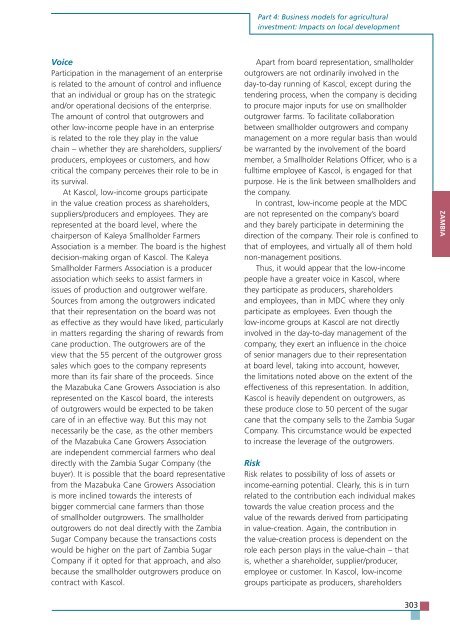TRENDS AND IMPACTS OF FOREIGN INVESTMENT IN DEVELOPING COUNTRY AGRICULTURE
TRENDS AND IMPACTS OF FOREIGN INVESTMENT IN DEVELOPING COUNTRY AGRICULTURE
TRENDS AND IMPACTS OF FOREIGN INVESTMENT IN DEVELOPING COUNTRY AGRICULTURE
You also want an ePaper? Increase the reach of your titles
YUMPU automatically turns print PDFs into web optimized ePapers that Google loves.
Voice<br />
Participation in the management of an enterprise<br />
is related to the amount of control and influence<br />
that an individual or group has on the strategic<br />
and/or operational decisions of the enterprise.<br />
The amount of control that outgrowers and<br />
other low-income people have in an enterprise<br />
is related to the role they play in the value<br />
chain – whether they are shareholders, suppliers/<br />
producers, employees or customers, and how<br />
critical the company perceives their role to be in<br />
its survival.<br />
At Kascol, low-income groups participate<br />
in the value creation process as shareholders,<br />
suppliers/producers and employees. They are<br />
represented at the board level, where the<br />
chairperson of Kaleya Smallholder Farmers<br />
Association is a member. The board is the highest<br />
decision-making organ of Kascol. The Kaleya<br />
Smallholder Farmers Association is a producer<br />
association which seeks to assist farmers in<br />
issues of production and outgrower welfare.<br />
Sources from among the outgrowers indicated<br />
that their representation on the board was not<br />
as effective as they would have liked, particularly<br />
in matters regarding the sharing of rewards from<br />
cane production. The outgrowers are of the<br />
view that the 55 percent of the outgrower gross<br />
sales which goes to the company represents<br />
more than its fair share of the proceeds. Since<br />
the Mazabuka Cane Growers Association is also<br />
represented on the Kascol board, the interests<br />
of outgrowers would be expected to be taken<br />
care of in an effective way. But this may not<br />
necessarily be the case, as the other members<br />
of the Mazabuka Cane Growers Association<br />
are independent commercial farmers who deal<br />
directly with the Zambia Sugar Company (the<br />
buyer). It is possible that the board representative<br />
from the Mazabuka Cane Growers Association<br />
is more inclined towards the interests of<br />
bigger commercial cane farmers than those<br />
of smallholder outgrowers. The smallholder<br />
outgrowers do not deal directly with the Zambia<br />
Sugar Company because the transactions costs<br />
would be higher on the part of Zambia Sugar<br />
Company if it opted for that approach, and also<br />
because the smallholder outgrowers produce on<br />
contract with Kascol.<br />
Part 4: Business models for agricultural<br />
investment: Impacts on local development<br />
Apart from board representation, smallholder<br />
outgrowers are not ordinarily involved in the<br />
day-to-day running of Kascol, except during the<br />
tendering process, when the company is deciding<br />
to procure major inputs for use on smallholder<br />
outgrower farms. To facilitate collaboration<br />
between smallholder outgrowers and company<br />
management on a more regular basis than would<br />
be warranted by the involvement of the board<br />
member, a Smallholder Relations Officer, who is a<br />
fulltime employee of Kascol, is engaged for that<br />
purpose. He is the link between smallholders and<br />
the company.<br />
In contrast, low-income people at the MDC<br />
are not represented on the company’s board<br />
and they barely participate in determining the<br />
direction of the company. Their role is confined to<br />
that of employees, and virtually all of them hold<br />
non-management positions.<br />
Thus, it would appear that the low-income<br />
people have a greater voice in Kascol, where<br />
they participate as producers, shareholders<br />
and employees, than in MDC where they only<br />
participate as employees. Even though the<br />
low-income groups at Kascol are not directly<br />
involved in the day-to-day management of the<br />
company, they exert an influence in the choice<br />
of senior managers due to their representation<br />
at board level, taking into account, however,<br />
the limitations noted above on the extent of the<br />
effectiveness of this representation. In addition,<br />
Kascol is heavily dependent on outgrowers, as<br />
these produce close to 50 percent of the sugar<br />
cane that the company sells to the Zambia Sugar<br />
Company. This circumstance would be expected<br />
to increase the leverage of the outgrowers.<br />
Risk<br />
Risk relates to possibility of loss of assets or<br />
income-earning potential. Clearly, this is in turn<br />
related to the contribution each individual makes<br />
towards the value creation process and the<br />
value of the rewards derived from participating<br />
in value-creation. Again, the contribution in<br />
the value-creation process is dependent on the<br />
role each person plays in the value-chain – that<br />
is, whether a shareholder, supplier/producer,<br />
employee or customer. In Kascol, low-income<br />
groups participate as producers, shareholders<br />
303<br />
ZAMBIA


